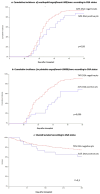The impact of donor-specific antibodies' presence on the outcome post-allogeneic hematopoietic stem cell transplantation: a survey from a single center
- PMID: 39234400
- PMCID: PMC11371551
- DOI: 10.3389/fonc.2024.1387181
The impact of donor-specific antibodies' presence on the outcome post-allogeneic hematopoietic stem cell transplantation: a survey from a single center
Abstract
Introduction: Donor-specific antibodies (DSAs) correspond to anti-HLA antibodies of the recipient that are specifically directed to a mismatched antigen of the donor. In the setting of solid organ transplantation DSAs are associated with rejection. Their role is still debated in allogeneic cell transplantation. International guidelines recommend testing patients for DSA before transplant, and if possible, choosing a donor with negative screening.
Methods: We collected clinical data of 236 recipients of alloSCT, performed at our institution from March 2019 to October 2023, to evaluate their impact on engraftment. Serum from all patients was tested for DSA.
Results: 186 patients (79%) achieved sustained myeloid engraftment within day 30 post alloSCT. Thirty-two out 236 (13%) patients engrafted after day 30 post alloSCT. The median times to neutrophil engraftment and platelet engraftment were respectively 21 days (range 11-121 days) and 19 days (range 10-203 days). Fourteen out 236 patients (6%) experienced PrGF. .Twenty-nine patients (12 %) were DSA-positive. Among 29 patients with DSA positivity, 17 had a haploidentical donor and 12 had a UD donor. DSA positivity directly correlates respectively with neutrophil and platelets engraftment failure at 30 days after alloSCT (p=0.01 and p= 0.0004). Univariate Cox analysis showed that factors, including DSAs positivity, disease type, disease status, donor type, conditioning regimen, patient's age, and CD34+ were correlated with neutrophil and platelet engraftment failure at 30 days after alloSCT. Younger patients with DSA negativity, with acute leukemia, in complete response at the time of transplant, who received a higher dose of CD34+ cells from a sibling donor after a myeloablative conditioning regimen, have a reduced risk of neutrophil and platelet engraftment failure at day +30 post alloSCT.Multivariate analysis confirmed the impact of the presence of DSA only for platelet engraftment, confirming the role of type and status disease, donor type, recipient age, and CD34+ cells infused on engraftment. DSA presence has no impact on TRM, DFS, and OS.
Discussion: PrGF has a multifactorial pathogenesis, where DSA is not the only player, but its impact could vary depending on the transplant platform. Thus patient screening may be helpful to choose the best donor and transplant strategy.
Keywords: allogeneic stem cell transplantation (allo-SCT); anti HLA antibodies; donor-specific antibodies; neutrophil and platelets engraftment failure; primary graft failure.
Copyright © 2024 Sica, Metafuni, Frioni, Limongiello, Galli, Sorà, Bacigalupo, Poggi, Feccia, Manfreda, Chiusolo and Giammarco.
Conflict of interest statement
The authors declare that the research was conducted in the absence of any commercial or financial relationships that could be construed as a potential conflict of interest. The author(s) declared that they were an editorial board member of Frontiers, at the time of submission. This had no impact on the peer review process and the final decision.
Figures
References
-
- Andolina JR, Walia R, Oliva J, Baran A, Liesveld J, Becker MW, et al. Non-donor specific anti-human leukocyte antigen (HLA) antibodies are not associated with poor outcome inhematopoietic stem cell transplant recipients. Hum Immunol. (2020) 81:407–12. doi: 10.1016/j.humimm.2020.05.006 - DOI - PubMed
-
- Chang YJ, Zhao XY, Xu LP, Zhang XH, Wang Y, Han W, et al. Donor-specific anti-human leukocyte antigen antibodies were associated with primary graft failure after unmanipulated haploidentical blood and marrow transplantation: a prospective study with randomly assigned training and validation sets. J Hematol Oncol. (2015) 8:84. doi: 10.1186/s13045-015-0182-9 - DOI - PMC - PubMed
LinkOut - more resources
Full Text Sources
Research Materials


